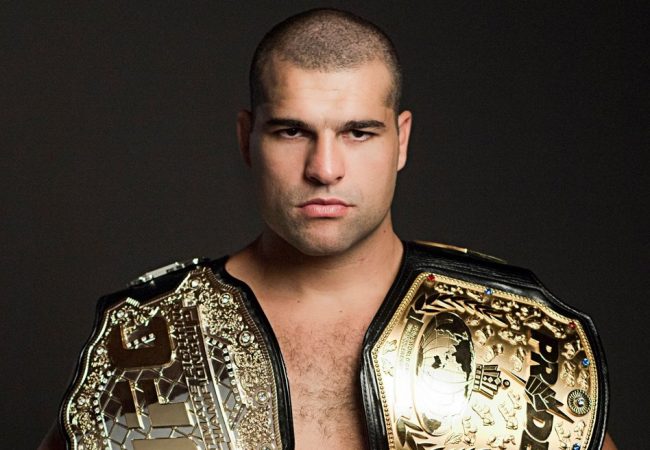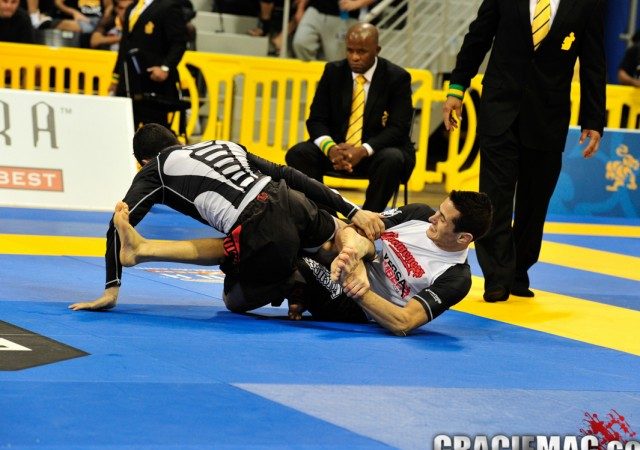
Caio Terra sinks the winning rear-naked choke in the roosterweight final. Photo by Ivan Trindade/GRACIEMAG.
GRACIEMAG: You’re the first and only five-time No-Gi Jiu-Jitsu world champion. But your first titles came at light featherweight, and now you’re down to roosterweight. What happened?
CAIO TERRA: I did an experiment on my body. I know my body well, and knew I could drop a bunch of weight without suffering, and ended up weighing 54 kilos, two less than what I needed to be to make roosterweight. And I wasn’t even thirsty or hungry! I even felt I could have dehydrated, but everything worked out well. I have no intention of making this weight again, but I thought it was interesting to discover that I can make 54 kg with no problem and still be just as nimble.
The half-guard has proven to be a dangerous weapon, and when you were on top you seemed to ignore it, both in the final and the semifinal…
Usually the half-guard, especially the deep half-guard, is the guard of choice for the player on bottom. But it’s not a position that frightens me. I study the whole spectrum of Jiu-Jitsu positions, not just that one, and so my body is used to it and understands my opponents’ reactions and defends multiple attacks. And as I was training to face Jeff Glover the previous month, I was really quick when on top in half-guard.
You seemed really relaxed at the 2012 No-Gi World Championship, after and especially during your two matches…
I feel a lot of Jiu-Jitsu competitors dub themselves “fighters” and end up believing it. A lot of folks go to championships like they would go to war, using all the force in the world, and they end up not learning anything. Some leave battle victorious; others, defeated. I have nothing against it; but I’m not going to kill anyone, nor fight for survival. I want to play Jiu-Jitsu for the rest of my life. I love training, and I don’t kill myself in training, because that way I’d end up retiring five, ten years from now.
That’s something you pass on to your students, right?
Yes. Jiu-Jitsu isn’t professional enough a sport yet for us to make a living just competing at tournaments. So I’d rather show that technique conquers all. I have to serve as an example for my students, and I want to give them the right example, mainly to the kids, since these days people are starting Jiu-Jitsu younger and younger.
What’s your take on the final against Fabbio Passos of team Alliance?
Fabbio is an excellent athlete and does a good job of defense. He may not have been warmed up when he entered the match, which gave me the opportunity to take his back so quickly. I think it was either coincidence or just my luck.
http://www.youtube.com/watch?v=DkOsEOazGKM
How do you divide your time between being an athlete and being Carlos Condit’s Jiu-Jitsu coach as he prepares to face GSP at UFC 154?
I had a lot of help from Itallo Vilardo, who’s probably currently the most qualified conditioning coach in the realm of Jiu-Jitsu. He didn’t just get me in shape; he helped me cut weight. Truth is, I only really trained Jiu-Jitsu on the week of the championship. I did a lot of aerobic exercise on my Versa Climber machine and my gas was great, better than it was at any other championship I’d been in over the last five years. Oh, the only mishap was that I ran late and missed signing up for the absolute. I’ll be at the next one.



